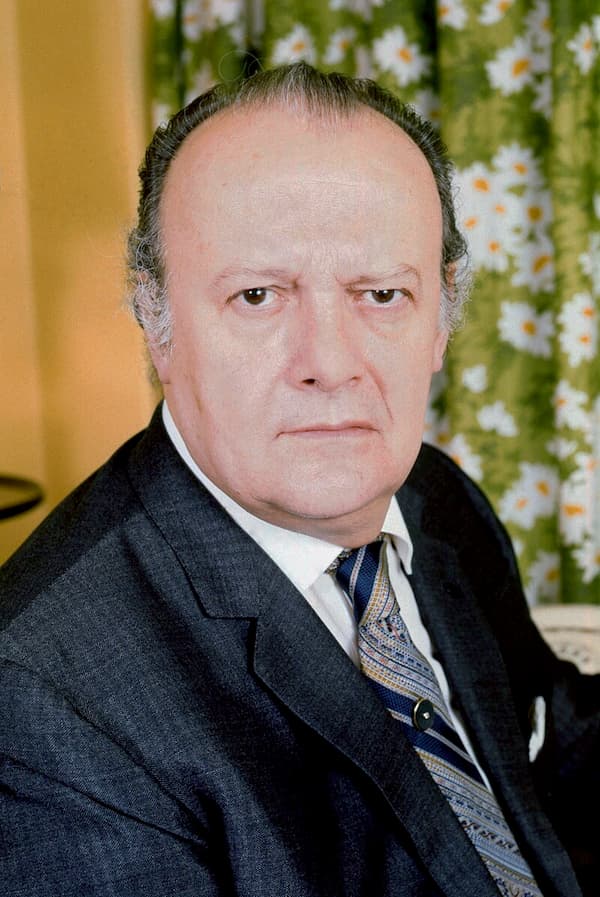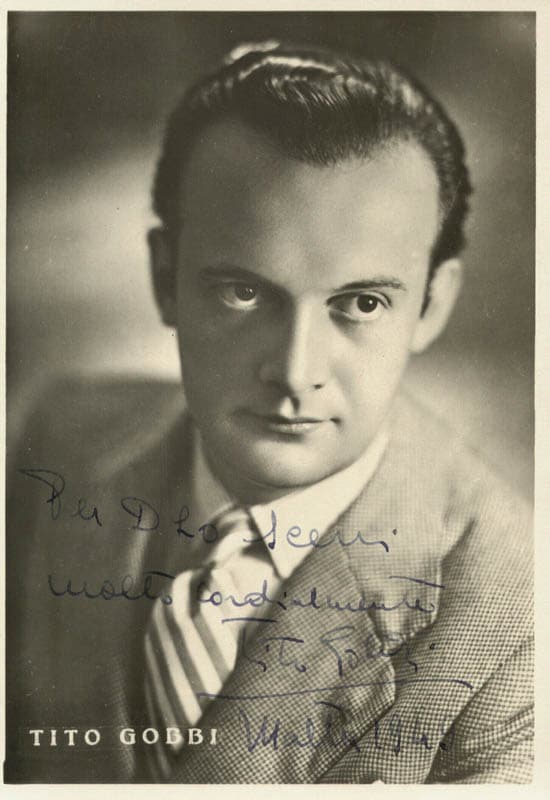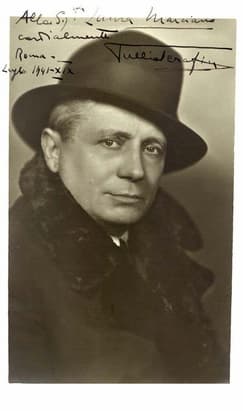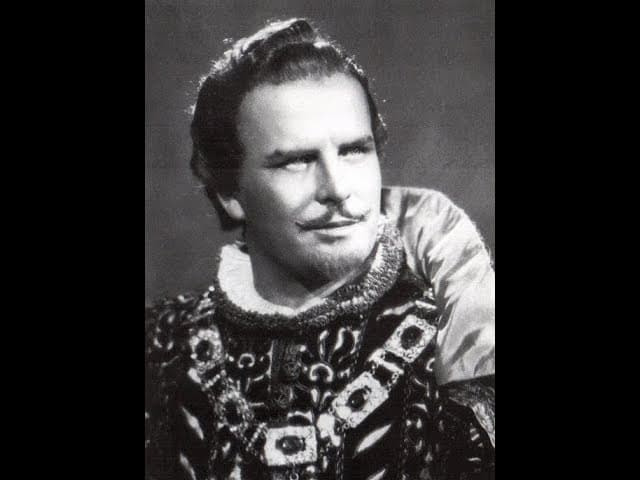The Italian baritone Tito Gobbi (1913-1984) was one of the great operatic figures of his time. Throughout his celebrated career, there were few who could match him as a singing actor, and he distinguished himself in a variety of roles. Gobbi had a subtle way of using his voice to illustrate the drama and emotion of the music, and he established an artistic benchmark with the fluidity and expressiveness of his instrument. As Alan Blyth writes, “Gobbi’s distinctive timbre and diction, and his ability to colour his tone made him an ideal recording artist, as can be heard in his Rigoletto, Boccanegra, Iago, Falstaff, and Gianni Schicchi.”
Tito Gobbi Sings Venetian Folksong
Baron Zanchetta

Tito Gobbi
Tito Gobbi was born in Bassano del Grappa on 24 October 1913. The third of five children, his father was a successful businessman and engineer. At a very young age, it was discovered that Tito suffered from asthma. His father hired a personal athletic trainer, and in his teens, Tito was a capable mountain climber, cyclist, and cross-country skier. He had always loved singing as a boy but initially had no ambitions to become a singer.
Tito sang in the school choir, but looking to join the family business, he enrolled at the University of Padua to study law. One summer, when he was playing tennis and singing at the same time, he was overheard by the composer and musicologist Baron Zanchetta. Zanchetta was impressed and asked the teenager to come around his house. He taught Tito two arias, and he urged the young man to take singing lessons.
Gaetano Donizetti: Lucia di Lammermoor, “Appressati, Lucia” (Tito Gobbi, baritone; Fiorentino Maggio Musicale Orchestra; Tullio Serafi, cond.)
Giulio Crimi

Tito Gobbi in 1949
Tito’s father wasn’t particularly keen on his son following an artistic career, but he eventually relented. Gobbi relates, “I was very lucky to have just one teacher, and a very good one, Giulio Crimi in Rome.” Crimi hailed from Sicily, and he sang throughout Italy. In fact, he created the role of Paolo Zandonai in Francesca da Rimini in Turin in 1914. Crimi also sang in London, Buenos Aires, the Lyric Opera in Chicago, and the Met in New York. He retired from the stage in 1927 and taught privately in Rome.
Over the next five-and-a-half years, Crimi shaped Gobbi’s voice, who made his operatic debut at Gubbio in 1935, with limited success, in the bass role of Count Rodolfo in Bellini’s La sonnambula. Crimi was waiting for him after the performance and frankly told him, “If you still want to study, you know where I live, goodbye.” Gobbi did continue his lessons, and in 1936, he won an international singing contest in Vienna that awarded him a scholarship at the La Scala theatre school.
Giuseppe Verdi: Falstaff, “L’onore! Ladri!” (Tito Gobbi, baritone; Vienna Philharmonic Orchestra; Herbert von Karajan, cond.)
Tullio Serafin

Tullio Serafin
In 1935, Gobbi was called by conductor Antonio Votto at the Adriano Theatre in Rome as an emergency replacement as Germont père in La traviata. By chance, Tullio Serafin, one of the leading Italian opera conductors, was in the audience. Serafin was a former Musical Director at La Scala, and he had an unparalleled reputation as a coach of young opera singers. Famously, he helped to develop Renata Tebaldi and Maria Callas’ considerable talents.
Serafin approached Gobbi after the performance in his dressing room, and he asked him to audition for him at the Royal Opera. He engaged Gobbi immediately, and he became a young member of the company. “Serafin was marvellous to me,” explained Gobbi. “I was like a young horse champing at the bit, and he kept me under control. For six years, I sang big and small roles with him in Rome.” Under his guidance, Gobbi would learn a remarkable 66 roles.
Gioachino Rossini: The Barber of Seville, “ Largo al factotum della citta” (Tito Gobbim baritone; Philharmonia Orchestra; Alceo Galliera, cond.)
Film and Recordings

Tito Gobbi in Rigoletto
In 1937, Giulio Crimi arranged for Gobbi to take his first role in a motion picture. He became widely known in the popular 1949 British drama set in wartime Italy, “The Glass Mountain.” He also played himself in the 1950 British film “Soho Conspiracy.” And, of course, he also starred in film operas, including “The Barber of Seville” in 1946 and “Simon Boccanegra” in 1965, in a production he directed. At the time of his death in 1984, Gobbi had appeared in 25 films, in both singing and speaking parts.
For critics, Gobbi’s love of opera, “both on stage and on disc, was one of his most towering achievements.” Despite being a highly successful acting singer, Gobbi enjoyed the process of recording, and he has an extensive discography to his name. He once remarked on the difference between a recording and a performance on stage, explaining “the voice alone must express every emotion, every nuance of tragedy, comedy or pathos. No telling gesture or subtle facial expression will be of any help. You will have to concentrate solely on sound and convey everything by that medium.”
For more of the best in classical music, sign up for our E-Newsletter
